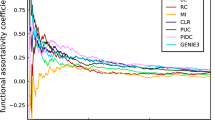Abstract
In this paper we introduce a new method of combined synthesis and inference of biological signal transduction networks. A main idea of our method lies in representing observed causal relationships as network paths and using techniques from combinatorial optimization to find the sparsest graph consistent with all experimental observations. Our contributions are twofold: on the theoretical and algorithmic side, we formalize our approach, study its computational complexity and prove new results for exact and approximate solutions of the computationally hard transitive reduction substep of the approach. On the application side, we validate the biological usability of our approach by successfully applying it to a previously published signal transduction network by Li et al. [20] and show that our algorithm for the transitive reduction substep performs well on graphs with a structure similar to those observed in transcriptional regulatory and signal transduction networks.
A full version of this paper will appear in Journal of Computational Biology.
Preview
Unable to display preview. Download preview PDF.
Similar content being viewed by others
References
Aho, A., Garey, M.R., Ullman, J.D.: The transitive reduction of a directed graph. SIAM Journal of Computing 1(2), 131–137 (1972)
Albert, R., Barabási, A.-L.: Statistical mechanics of complex networks. Reviews of Modern Physics 74(1), 47–97 (2002)
Alberts, B.: Molecular biology of the cell. Garland Pub., New York (1994)
Albert, R., DasGupta, B., Dondi, R., Sontag, E.: Inferring (Biological) Signal Transduction Networks via Transitive Reductions of Directed Graphs, Algorithmica (to appear)
Carter, G.W.: Inferring network interactions within a cell. Briefings in Bioinformatics 6(4), 380–389 (2005)
Chen, T., Filkov, V., Skiena, S.: Identifying Gene Regulatory Networks from Experimental Data. In: Proc. of third RECOMB, pp. 94–103 (1999)
Cormen, T.H., Leiserson, C.E., Rivest, R.L., Stein, C.: Introduction to Algorithms. The MIT Press, Cambridge (2001)
DasGupta, B., Enciso, G.A., Sontag, E.D., Zhang, Y.: Algorithmic and Complexity Results for Decompositions of Biological Networks into Monotone Subsystems. In: Àlvarez, C., Serna, M. (eds.) WEA 2006. LNCS, vol. 4007, pp. 253–264. Springer, Heidelberg (2006)
Filkov, V.: Identifying Gene Regulatory Networks from Gene Expression Data. In: Aluru, S. (ed.) Handbook of Computational Molecular Biology, Chapman & Hall/CRC Press, Sydney, Australia (2005)
Frederickson, G.N., JàJà, J.: Approximation algorithms for several graph augmentation problems. SIAM Journal of Computing 10(2), 270–283 (1981)
Giot, L., Bader, J.S., et al.: A protein interaction map of Drosophila melanogaster. Science 302, 1727–1736 (2003)
Han, J.D., Bertin, N., et al.: Evidence for dynamically organized modularity in the yeast protein-protein interaction network. Nature 430, 88–93 (2004)
Heinrich, R., Schuster, S.: The regulation of cellular systems. Chapman & Hall, New York (1996)
Jeong, H., Tombor, B., Albert, R., Oltvai, Z.N., Barabási, A.-L.: The large-scale organization of metabolic networks. Nature 407, 651–654 (2000)
Jong, H.D.: Modelling and Simulation of Genetic Regulatory Systems: A Literature Review. Journal of Computational Biology 9(1), 67–103 (2002)
Khuller, S., Raghavachari, B., Young, N.: Approximating the minimum equivalent digraph. SIAM Journal of Computing 24(4), 859–872 (1995)
Khuller, S., Raghavachari, B., Young, N.: On strongly connected digraphs with bounded cycle length. Discrete Applied Mathematics 69(3), 281–289 (1996)
Lee, T.I., Rinaldi, N.J., et al.: Transcriptional regulatory networks in Saccharomyces cerevisiae. Science 298, 799–804 (2002)
Li, S., Armstrong, C.M., et al.: A map of the interactome network of the metazoan C. elegans. Science 303, 540–543 (2004)
Li, S., Assmann, S.M., Albert, R.: Predicting Essential Components of Signal Transduction Networks: A Dynamic Model of Guard Cell Abscisic Acid Signaling. PLoS Biology 4(10) (October 2006)
Ma’ayan, A., et al.: Formation of Regulatory Patterns During Signal Propagation in a Mammalian Cellular Network. Science 309(5737), 1078–1083 (2005)
Newman, M.E.J., Strogatz, S.H., Watts, D.J.: Random graphs with arbitrary degree distributions and their applications. Phys. Rev. E 64(2), 26118–26134 (2001)
Shen-Orr, S.S., Milo, R., Mangan, S., Alon, U.: Network motifs in the transcriptional regulation network of Escherichia coli. Nature Genetics 31, 64–68 (2002)
Vetta, A.: Approximating the minimum strongly connected subgraph via a matching lower bound. In: 12th ACM-SIAM Symposium on Discrete Algorithms, pp. 417-426 (2001)
Wagner, A.: Estimating Coarse Gene Network Structure from Large-Scale Gene Perturbation Data. Genome Research 12, 309–315 (2002)
Author information
Authors and Affiliations
Editor information
Rights and permissions
Copyright information
© 2007 Springer-Verlag Berlin Heidelberg
About this paper
Cite this paper
Albert, R. et al. (2007). A Novel Method for Signal Transduction Network Inference from Indirect Experimental Evidence . In: Giancarlo, R., Hannenhalli, S. (eds) Algorithms in Bioinformatics. WABI 2007. Lecture Notes in Computer Science(), vol 4645. Springer, Berlin, Heidelberg. https://doi.org/10.1007/978-3-540-74126-8_38
Download citation
DOI: https://doi.org/10.1007/978-3-540-74126-8_38
Publisher Name: Springer, Berlin, Heidelberg
Print ISBN: 978-3-540-74125-1
Online ISBN: 978-3-540-74126-8
eBook Packages: Computer ScienceComputer Science (R0)




